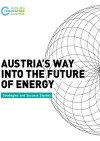Suchergebnisse
Folder: Auf dem Weg zum Plusenergiequartier
Der neu erschienene Info-Folder bietet einen Überblick über Technologien und Teilsysteme für Plusenergiequartiere und liefert Erklärungen, welche strategischen Ziele mit dem Programm „Stadt der Zukunft“ verfolgt werden.
TPPV-Award für „Haus der Zukunft“-Demonstrationsprojekt
Bereits zum zweiten Mal wurden die besten Projekte für Bauwerkintegrierte Photovoltaik (BIPV) mit dem „Innovationsaward für Bauwerkintegrierte Photovoltaik“ der österreichischen Technologieplattform Photovoltaik (TPPV) ausgezeichnet. Einreichen konnten ArchitektInnen, BauherrInnen, PlanerInnen, EigentümerInnen und Unternehmen. Das Haus der Zukunft-Demoprojekt "Windkraft Simonsfeld" wurde als innovativstes Betriebsgebäude ausgezeichnet.
Green Market Report Kompakt: Bauwerksbegrünung belebt Konjunktur
Erste Zahlen aus dem vom BMK beauftragten Green Market Report zeigen, dass in der heimischen Bauwerksbegrünung mehr als 8.000 direkte und weitere 25.000 indirekte neue Arbeitsplätze entstehen können.
DigitalFindetStadt - Plattform für digitale Innovationen der Bau- und Immobilienwirtschaft
"Digital Findet Stadt" stärkt die digitale Innovationskraft der österreichischen Bau- und Immobilienwirtschaft und trägt damit zu einer wesentlichen Steigerung der Ressourcen-, Energie- und Kosteneffizienz bei.
Innovationspartnerschaft für die Transformation des Energiesystems in der Region Weiz
Die Region WEIZplus möchte sein zukünftiges Energiesystem zu 100 % erneuerbar auszurichten - proaktiv, gemeinschaftlich und mittels regionaler Wertschöpfung. Nun wurde zwischen der "EnergieZukunft WEIZplus" und dem „NEXT-Incubator" der Energie Steiermark AG eine Kooperation gestartet, um innovative Projekte umzusetzen sowie Geschäftsmodelle und Pilotanlagen unter realen Bedingungen zu testen.
DigitalFindetStadt - Platform for digital innovations in the building sector
"Digital Findet Stadt" strengthens the digital innovation power of the Austrian building sector and thus contributes to a significant increase in resource, energy and cost efficiency.
GreEnergieausweis AT - Wege der Integration von Begrünung in den österreichischen Energieausweis
Anpassung der Berechnungsmodelle im Energieausweis derart, dass Gebäudebegrünung darin möglichst realistisch abgebildet werden kann und Abschätzung zur Akzeptanz einer Umsetzung bei relevanten Stakeholdern.
GreEnergieausweis AT - Ways of integrating greenery into the Austrian Energy Certificate
Adaption of the calculation models in the energy certificate in such a way that the greening of buildings can be depicted as realistically as possible and assessment of the acceptance of implementation by relevant stakeholders.
ReHABITAT-Settlement: Sustainable rehabilitation and activation of a single-family housing estate in Mistelbach
Exploration of a sustainable single-family house redevelopment, with a holistically conceived definition of sustainability that starts with people, is based on sufficiency and also takes into account green and open spaces, social factors and mobility. The result is an integrated overall concept at the house and settlement level, and a transferable approach for other communities.
Mission Innovation Austria Award 2019
Im Rahmen der Mission Innovation Austria Week 2019 wurde erstmals der „Mission Innovation Austria Award“ in vier Kategorien vergeben. Damit wurden herausragende Leistungen im Bereich der Forschung und Innovation zur Gestaltung zukünftiger Energiesysteme gewürdigt und im Rahmen einer glanzvollen Preisverleihung vor den Vorhang geholt.
LZE 100 Leuchtturmobjekte - Langzeitevaluierung des Energieverbrauchs von 100 energieeffizienten Gebäuden in Österreich als repräsentativer Querschnitt österreichischer Leuchtturmobjekte
Erfassung, Auswertung und Analyse von Energieverbrauchsdaten von 100 energieeffizienten Gebäuden in Österreich über eine Betriebszeit von 3 bis 25 Jahren als repräsentativer Querschnitt der österreichischen Leuchtturmobjekte. Differenzierung nach Gebäudetypen, Energieträger und Ermittlung der realen Treibhausgas-Emissionen. Vergleich der gemessenen Verbräuche zu Benchmark-Werten.
LZE 100 Lighthouse Objects - Long-term evaluation of the energy consumption of 100 energy-efficient buildings in Austria as a representative cross-section of Austrian lighthouse objects
Collection, evaluation and analysis of energy consumption data from 100 energy-efficient buildings in Austria over an operating time of 3 to 25 years as a representative cross-section of Austrian lighthouse objects. Differentiation according to building types, energy sources and determination of real greenhouse gas emissions. Comparison of the measured consumption to benchmark values.
Mission Innovation Austria Awards 2022: Wärmepumpen, Schulmilch, grünes Geld und Spannungsregelung
Die Mission Innovation Austria Awards würdigen in vier Kategorien herausragende Leistungen von Persönlichkeiten, Unternehmen und Projektteams in den Bereichen Energiewende, Kreislaufwirtschaft und klimaneutrale Stadt.
Evaluierung des Programms "Stadt der Zukunft": Nehmen Sie bis 24. Juni an der Befragung teil
Die KMU Forschung Austria führt im Auftrag des BMK eine Evaluierung des Programms "Stadt der Zukunft" durch. Wir möchten herausfinden, ob die Überführung der Forschungsergebnisse in die Praxis gelungen ist. Mit der Teilnahme an der Befragung leisten Sie einen wichtigen Beitrag zur bedarfsorientierten Gestaltung von Forschungs- und Entwicklungsvorhaben.
Großes Interesse bei der Ausschreibung 100% Erneuerbare Energie Reallabore
Mit der Initiative „100% Erneuerbare Energie Reallabore“ unterstützt das BMK Unternehmen, Bürger:innen und Gemeinden, ihre regionalen Energielösungen gemeinsam umzusetzen. Regionale Konsortien aus ganz Österreich haben ambitionierte Projektvorschläge eingebracht, die das Potential haben, einen substantiellen Beitrag zur Energiewende zu leisten.
Urban Future
5. - 7. June 2024
Rotterdam Ahoy Convention Center, Ahoyweg 10, 3084 BA Rotterdam (NL)
During the #UrbanFuture conference week, the city is eager to share its knowledge and discover new ideas from other cities.
Mobilization of innovative design tools for refurbishing of buildings at district level
29. September 2016, 14:00 - 18:00 Uhr
Europasaal, Wirtschaftskammer OÖ, Hessenplatz 3, 4020 Linz
In this workshop the ongoing research from the MODER project will be published.
Forum Kreislaufwirtschaft und Produktionstechnologien - Forschung, Technologie und Innovation für die Ressourcenwende
14. - 15. Mai 2024
Brotfabrik, Ankersaal, Absberggasse 27, 1100 Wien
Forschungstrends in den Themenfeldern Kreislaufwirtschaft, Künstliche Intelligenz für die grüne Transformation der Industrie, datengetriebene Innovationen für die Produktion, Materialentwicklungen für erneuerbare Energieproduktionstechnologien, Biobasierte Industrie sowie Additive Fertigung.
Austria's Way into the Future of Energy - Strategies and Success Stories (2019)

This broschure illustrates strategies and success stories from research & development for a sustainable energy future.
Herausgeber: Federal Ministry for Transport, Innovation and Technology, Climate and Energy Fund, Austrian Economic Chambers
Englisch, 68 Seiten
Downloads zur Publikation
Zukunftsquartier 2.0 - Replizierbare, thermisch und elektrisch netzdienliche Konzeption von (Plus-Energie) Quartieren im dichten urbanen Kontext
Entwicklung eines replizierbaren Konzepts zur netzdienlichen Integration von innovativen (Plus-Energie-) Quartieren mit hoher Vor-Ort- Energieaufbringung in die bestehende Netzinfrastruktur (Strom- und Fernwärmenetz).
